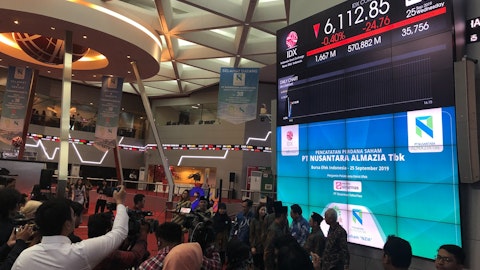Ravi Shanker: A couple of follow-ups here. Just on the ground actions in the third quarter that kind of helped drive the margin higher than expected. Can you help us understand if these are a permanent change in the way you treat peak season or even a permanent change in the way Ground is run every quarter, or was it just a reaction to, obviously, peak season this time being less robust than it was the last two years? I’m trying to get a sense of whether it was just a tactical move and you guys kind of pivoted very quickly to the market, or if it’s more of a permanent change in the way you deal with peak season?
Mike Lenz: No. Ravi, this definitely illustrates the discipline, rigor and focus we have around responding, adjusting to changes in the volume environment, running an efficient network and adjusting in short order. Again, I’d highlight last year was — quite frankly, the last two years, were quite unprecedented in terms of ability to both project and understand demand because our customers themselves were — had a lot of uncertainty amidst the dynamics of the pandemic. And we sometimes skip over it, but the profundity of the labor availability and the immediate cost increases in terms of higher wage rates that were experienced at Ground can’t be diminished. But this is a rigor and discipline that, as Brie said, it also supports our service levels across the board, too. So, it’s a virtuous cycle there that we’ll build upon going forward.
Operator: Our next question is from Jeff Kauffman, Vertical Research Partners.
Jeff Kauffman: Question for Brie. Brie, we were out talking to different customers, and some had indicated to us that they were a little concerned about the potential for a labor action at one of your competitors and had begun shipping with you guys, which is something they didn’t normally do. I was just wondering, I guess, a, we could look at this as, oh, it’s a short-term thing; b, we could look at this as it’s an opportunity to bring in some new customers. And I was told that you had to be shipping at certain levels to be available if there was a problem and there was a lack of capacity. Could you talk about how you’re engaging some of these customers that may be coming to you and saying, hey, I’m nervous. Can I get some capacity or can I come over? Are you requiring them to stay on for a year? How do we make this more than just a short-term use of excess capacity in your network?
Brie Carere: Hey. Jeff, thanks for the question. So I think first and foremost is that our primary goal is to maintain and improve the service momentum that we’ve created. And so, as we think about any potential exogenous factor in the market that might put stress in the market, our goal is to protect our customers and to make sure that we’re there for them. So absolutely, as customers are inquiring about available capacity at FedEx, we have been really clear that, yes, of course, we would entertain any good business, and we’d love to talk to them. We do need to have that business on board and those contracts signed by the end of March. We are not going to put or staff up like this is a peak factor. We are going to plan for long-term partnerships with customers. And anybody that wants to come and enjoy the FedEx value proposition, we’re happy to talk to them prior to March 31st.
Operator: This concludes the question-and-answer portion of today’s call
Raj Subramaniam: Thank you, operator.
Operator: Please continue, Mr. Subramaniam.




